Prostate health is key for men’s well-being, and diet is a big part of it. In 2019, prostate cancer was the second-most common cancer in men, as the CDC reports. The World Health Organization says red meat might increase prostate cancer risk, showing the need for smart food choices.
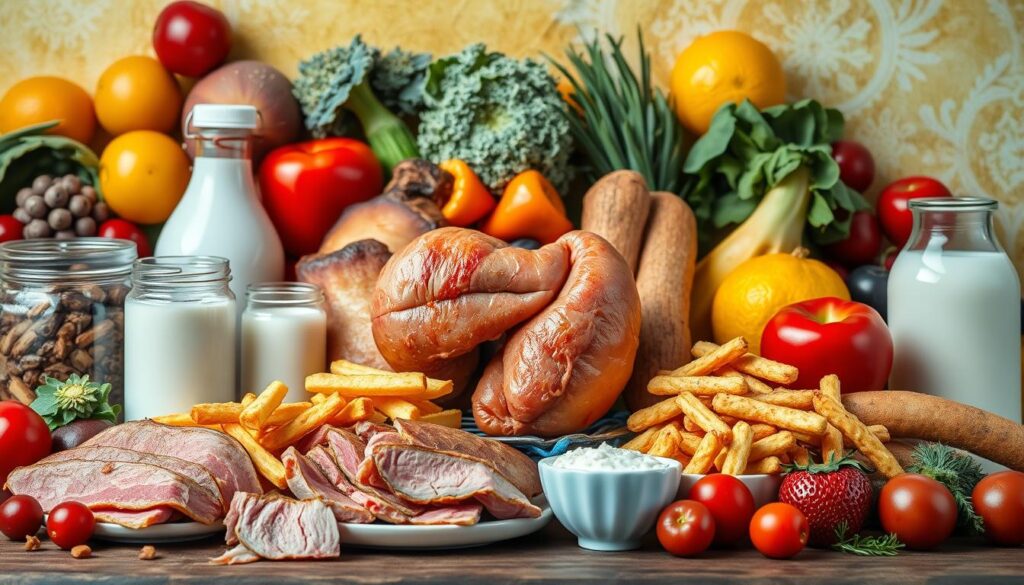
Good prostate health comes from a balanced diet, avoiding bad foods. Non-grass-fed beef and processed meats can raise prostate cancer risk. But, cooked tomatoes, fatty fish, and cruciferous veggies can lower it. Knowing how foods affect prostate health helps men make better choices for their health.
Key Takeaways
- Eating a balanced diet is key for good prostate health and lowering prostate cancer risk.
- Red meat and processed meats can increase prostate cancer risk.
- Cooked tomatoes, fatty fish, and cruciferous veggies can lower prostate cancer risk.
- Reducing saturated fat, found in red meat and dairy, may lower prostate cancer risk.
- Drinking at least eight glasses of water a day helps flush out toxins and supports prostate health.
- Avoiding spicy, acidic, and sugary foods can ease enlarged prostate symptoms.
Understanding Your Prostate and Dietary Impact
The prostate gland is key to the male reproductive system. As men get older, the chance of getting benign prostatic hyperplasia (BPH) goes up. About half of men between 51-60 years old get BPH, and up to 80% of men over 70 do too. Eating right is important for managing BPH and lowering prostate cancer risk.
Eating healthy can ease BPH symptoms and keep the prostate healthy. Foods full of antioxidants, like berries, cruciferous veggies, and tomatoes, help fight inflammation and boost prostate function. But, eating too much processed meat, sugar, and saturated fats can harm the prostate.
What Does the Prostate Do?
The prostate gland makes fluids for semen and helps control urine flow. An enlarged prostate can cause urinary issues like needing to pee a lot, weak urine flow, and painful peeing.
How Diet Affects Prostate Health
Changing your diet can help with BPH and lower prostate cancer risk. Eating lots of fruits, veggies, and whole grains gives you important nutrients and antioxidants. Cutting down on processed meats, sugar, and saturated fats can also help fight inflammation and keep the prostate healthy.

Signs of Poor Prostate Health
Poor prostate health can show as urinary problems, painful peeing, and needing to pee a lot. If not treated, BPH can lead to serious issues like kidney damage and bladder stones. Regular check-ups with a doctor can catch and manage prostate problems early.
Knowing how diet affects prostate health and making smart food choices can lower BPH risk. A balanced diet, regular exercise, and a healthy lifestyle can help keep the prostate working well and lower cancer risk.
| Dietary Factor | Recommended Intake | Risk Reduction |
|---|---|---|
| Cruciferous vegetables | 2-3 servings per week | Reduced risk of prostate cancer |
| Canned and cooked tomatoes | 5-6 servings per week | 28% decreased risk of prostate cancer |
| Processed meat | Limit intake to 1-2 servings per week | Reduced risk of prostate cancer |
The Science Behind Food and Prostate Function
A prostate diet full of fruits, veggies, and whole grains can lower prostate cancer risk. Studies show that eating anti-inflammatory foods and antioxidants can help. For instance, eating cruciferous veggies can lower inflammation and reduce prostate cancer risk.
Some prostate-friendly foods are green tea, dark-meat fish like salmon, and tomatoes. A study in Medicine (Baltimore) found that drinking seven cups of green tea daily can lower prostate cancer risk. Cooking tomatoes makes lycopene more available in the body, which is good for the prostate.
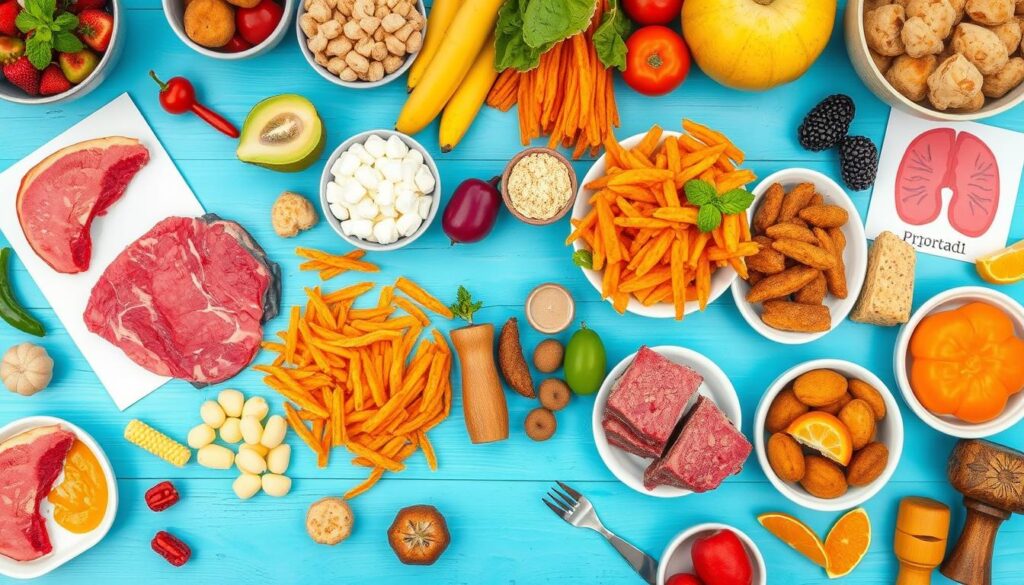
Drinking 1 to 2 cups of coffee a day might also lower prostate cancer risk. A prostate diet with these foods supports prostate health. Key foods for a prostate-friendly diet include:
- Cruciferous vegetables
- Green tea
- Dark-meat fish like salmon
- Tomatoes
- Coffee
Adding these foods to a prostate diet can help men keep their prostate healthy and lower cancer risk. A prostate-friendly diet is key to overall health and well-being.
Red Meat and Prostate Health Concerns
Red meat, and processed meat in particular, is linked to a higher risk of prostate cancer. The World Health Organization says red and processed meats may raise the risk of prostate cancer. This is a big worry for men, as cutting down on red meat can help.
Research shows eating too much red meat, and cooking it at high heat, can up the risk of prostate cancer. It’s advised to limit cooked red meats to 500 grams a week. Knowing these risks and taking steps to lower them is key.

To lessen the risks of red meat, it’s important to choose leaner cuts and cook at lower temperatures. Adding more plant-based foods to your diet is also a good move. Being mindful of your diet and making smart choices can help keep your prostate healthy.
Here are some important tips for red meat and prostate health:
- Limit red meat to 500 grams or less a week.
- Try to avoid processed meats as much as you can.
- Cook at lower temperatures to cut down on harmful substances.
- Add more plant-based foods to your diet.
Dairy Products: The Calcium Controversy
Dairy products are a topic of debate when it comes to prostate health benefits. Calcium is key for health, but too much dairy might raise prostate cancer risk. Yet, low-fat dairy could be safer for prostate health and nutrition.
Adults need 700 mg of calcium daily. Low-fat dairy is a good calcium source. Some studies link high dairy intake to prostate cancer risk. But, other studies disagree. It’s important to look at the whole diet and lifestyle when thinking about dairy’s effects.

- Choose low-fat dairy products to reduce the risk of prostate cancer
- Consume dairy products in moderation as part of a balanced diet
- Consider alternative sources of calcium, such as leafy greens and fortified plant-based milk
Knowing the risks and benefits of dairy helps make better diet choices. This supports overall prostate health and nutrition. Always talk to a healthcare professional or dietitian for advice on prostate health.
Hidden Sugars and Their Impact on the Prostate
High sugar intake is linked to a higher risk of prostate cancer. It’s key to know how hidden sugars affect prostate health. A healthy lifestyle, including prostate health and exercise, is vital for well-being. Being aware of the foods we eat and their effects on prostate health and lifestyle is important.
Eating too much sugar can cause inflammation. This has been linked to a 30% higher risk of prostate problems. It’s not just about avoiding obvious sugary foods. We also need to watch out for hidden sugars in products.
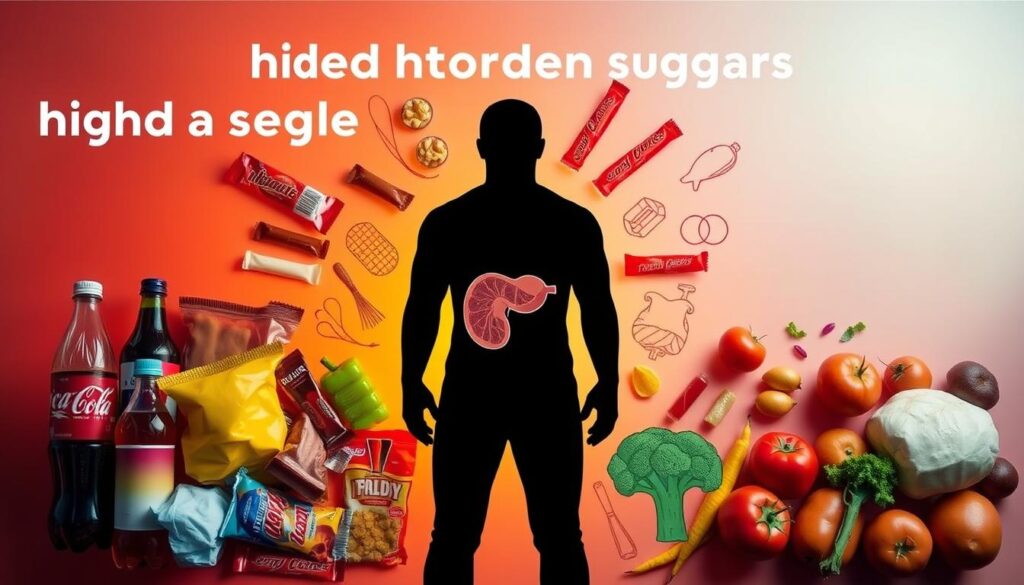
Artificial Sweeteners vs Natural Sugars
Artificial sweeteners might seem like a better choice, but research shows they can mess with our metabolism. This could harm prostate health. Natural sugars, found in fruits and veggies, are better in moderation.
Reading Labels for Hidden Sugars
It’s important to learn how to spot hidden sugars on labels. Look for sucrose, fructose, and maltodextrin. By being careful with sugar intake and adding prostate health and exercise to our daily lives, we can help keep our prostate healthy. This contributes to a better prostate health and lifestyle.
Alcohol’s Effect on Prostate Function
Drinking too much alcohol can harm your prostate health. It may raise your risk of getting prostate cancer. The American Cancer Society suggests drinking no more than two drinks a day to lower these risks.
It’s important to know how alcohol affects your prostate. This helps keep your prostate healthy. Knowing the risks of different drinks is key.
Beer and Prostate Enlargement
Drinking beer can increase your risk of having an enlarged prostate. This is because beer has a lot of hops. Hops make a hormone called DHT, which can make your prostate grow.
Safe Drinking Guidelines
To stay safe, follow these drinking rules. Drink in moderation and choose your drinks wisely. Eating right can also help counter alcohol’s bad effects.
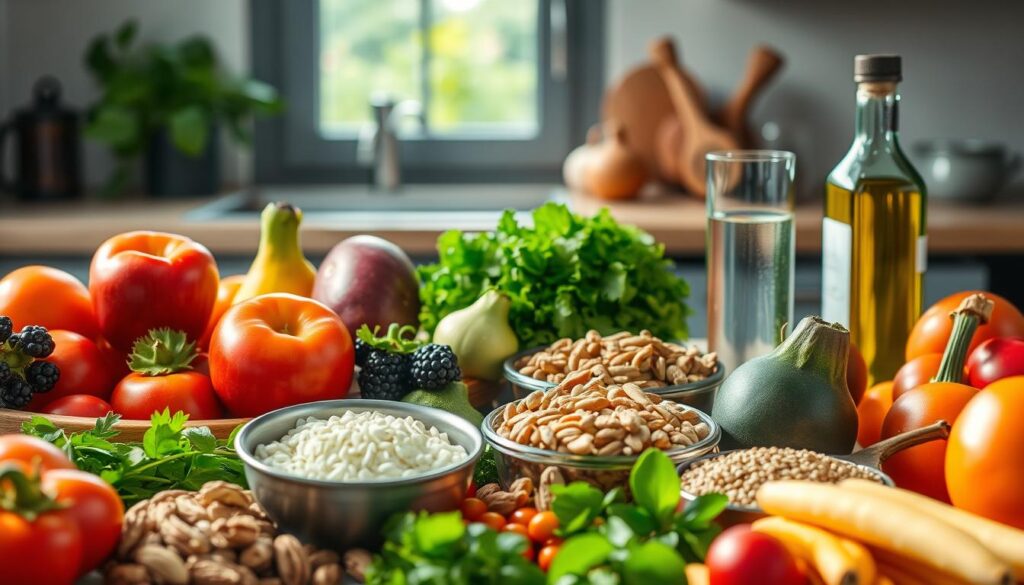
Learning about alcohol’s impact on your prostate is vital. Taking steps to keep your prostate healthy can lower risks. This helps you stay well overall.
| Alcohol Consumption | Recommended Limit |
|---|---|
| Men | No more than 2 drinks per day |
Caffeine and Its Role in Prostate Health
Caffeine can affect prostate health benefits in different ways. Drinking it in moderation might be good, but too much can harm. Knowing how caffeine impacts prostate health and lifestyle is key to making smart choices.
Research shows that too much caffeine can bother the bladder, making urinary problems worse. But, drinking it in small amounts might not hurt prostate health benefits too much. It’s important to find a balance and think about how it fits into your prostate health and lifestyle.
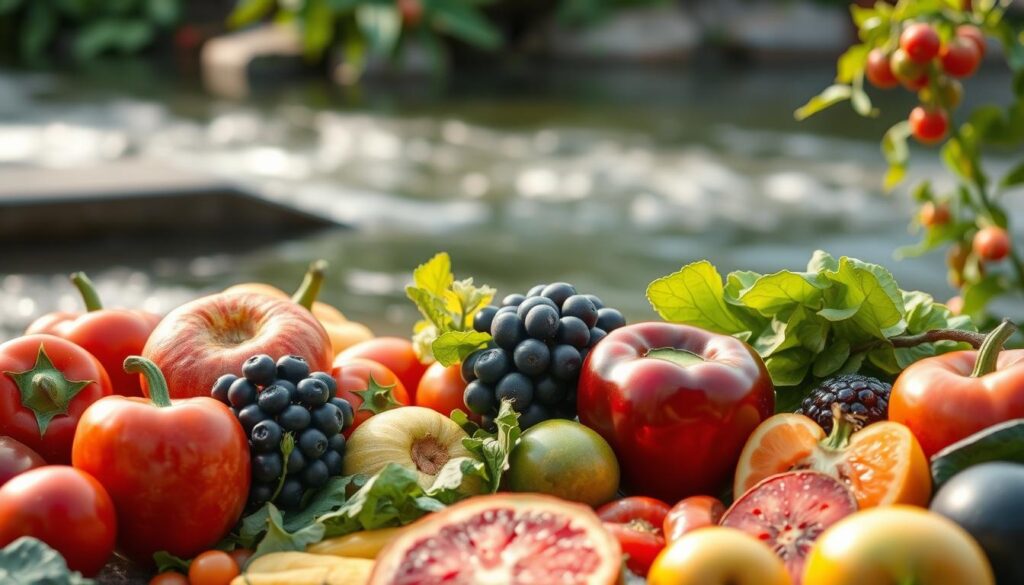
- Limit caffeine intake to moderate levels (less than 300 mg/day)
- Avoid consuming caffeine in excess, specially in the afternoon and evening
- Balance caffeine consumption with a healthy prostate health and lifestyle, including a balanced diet and regular exercise
Being mindful of caffeine’s effects on prostate health benefits can help. Making smart choices can lead to a healthier prostate health and lifestyle.
Processed Foods: The Silent Prostate Enemy
Processed foods can harm your prostate health. They often have additives that may raise your risk of prostate cancer. Knowing what to avoid and making smart choices can help. Experts say to eat less processed food for a healthy diet.
Common Additives to Avoid
Processed foods have preservatives and artificial flavorings that are bad for your prostate. Always check the labels and pick foods with natural ingredients.
Inflammation-Causing Ingredients
Ingredients like saturated fats and sodium can cause inflammation. This can lead to prostate issues. Nutrition experts suggest eating whole foods to avoid inflammation and stay healthy.
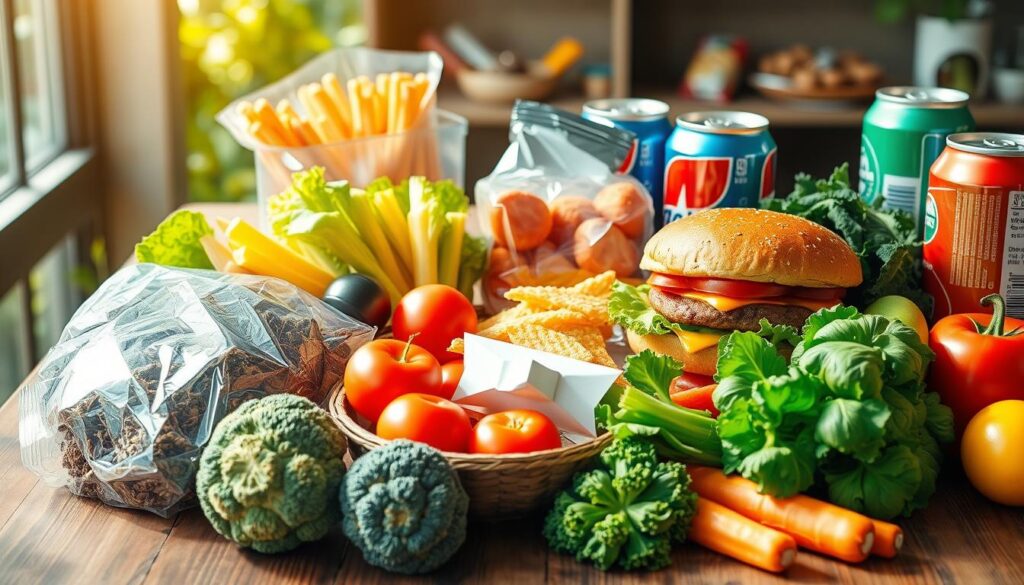
By following these tips and watching what you eat, you can protect your prostate. This can lower your risk of prostate cancer.
Salt and Sodium: Finding the Right Balance
Too much sodium can raise the risk of prostate cancer. It’s key to balance sodium and potassium for a healthy prostate. Regular prostate health and exercise also helps lower prostate health risks.
To cut down on sodium, try these tips:
- Choose fresh foods over processed ones
- Season with herbs and spices instead of salt
- Limit sodium-rich condiments
Eating foods high in potassium, like bananas and leafy greens, can help. A balanced diet and regular prostate health and exercise can lessen prostate health risks from too much sodium.

Being careful with sodium and potassium can help support prostate health. It can also lower the chance of prostate problems.
| Food | Sodium Content | Potassium Content |
|---|---|---|
| Processed meats | High | Low |
| Fresh fruits | Low | High |
| Canned goods | High | Low |
10 Worst Foods for Prostate Health: Complete List
It’s important to watch what we eat for our prostate health. Some foods can harm our prostate, raising the risk of cancer and other problems. Eating right can help keep our prostate healthy.
Bad foods for our prostate include red meat, processed meat, and dairy. Also, foods with a lot of sugar and saturated fat are not good. These can make inflammation worse and make symptoms more severe. Eating more fruits, vegetables, and whole grains is better for our prostate.
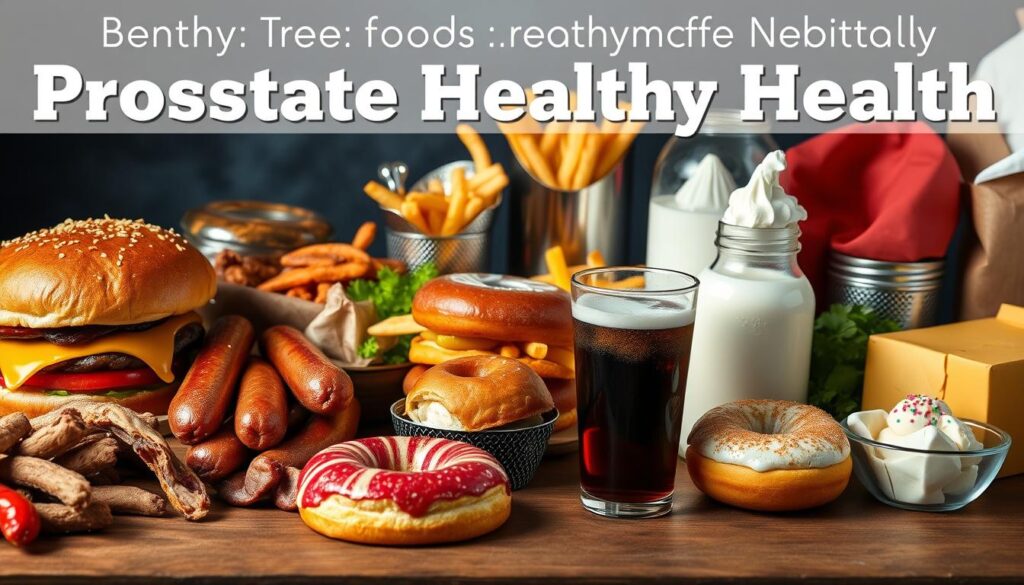
- Red meat
- Processed meat
- Dairy products
- Foods high in sugar
- Foods high in saturated fat
Knowing which foods to avoid can help us stay healthy. Making smart food choices can lower the risk of prostate problems. It also helps us feel better overall.
Trans Fats and Their Long-term Effects
Understanding the impact of different foods on prostate health and nutrition is key. Trans fats, known to raise heart disease risk, also increase prostate cancer risk. This shows why avoiding trans fats is vital for a healthy prostate.
While no single food is proven to directly affect prostate cancer, a balanced diet is recommended. Foods like soya beans, green tea, and tomatoes are suggested to have benefits. But, studies show mixed results.
It’s also important to know which foods might harm the prostate. Foods like dairy, red meat, and fatty foods should be limited. Avoiding processed meat is advised due to its cancer risk. Trans fats, in particular, are linked to increased cancer risk, including prostate cancer.

To reduce prostate health risks, limit trans fats. Many countries’ trans fat intake is a concern, despite regulations. By choosing a balanced diet and knowing the risks of certain foods, you can protect your prostate health.
| Foods to Limit | Reason |
|---|---|
| Processed Meat | Increased risk of other cancers |
| Fatty Foods | Potential harm to prostate health |
| Trans Fat Containing Foods | Linked to increased risk of prostate cancer and metabolic diseases |
The Role of Cooking Methods in Prostate Health
Cooking methods are key to prostate health. Some ways of cooking can raise the risk of prostate cancer. Grilling and frying, for example, can be harmful because of the high heat and carcinogens formed.
Steaming and baking are better choices. They help keep nutrients in food and lower cancer risk.
Some prostate health tips include picking cooking methods that don’t harm. Steaming veggies instead of frying keeps more nutrients. Also, using herbs and spices for flavor is healthier than salt and sugar.
Here are some better alternatives for food preparation:
- Steaming: helps retain nutrients and reduces the risk of prostate cancer
- Baking: a healthier alternative to frying, as it uses less oil and heat
- Grilling with caution: use lower heat and avoid charring to reduce the formation of carcinogens

By following these prostate health tips, you can lower your risk of prostate cancer. Always choose cooking methods that keep nutrients in and avoid harmful compounds. This way, you get the most prostate health benefits.
| Cooking Method | Prostate Health Benefit |
|---|---|
| Steaming | Retains nutrients, reduces cancer risk |
| Baking | Healthier alternative to frying, uses less oil and heat |
| Grilling with caution | Reduces formation of carcinogens, promotes healthy eating |
Environmental Toxins in Food
Environmental toxins like pesticides and heavy metals can raise the risk of prostate cancer. Knowing about these toxins and making smart choices can lower the risk. A prostate health and lifestyle that includes a balanced diet and avoids harmful substances is key.
Some foods may have high levels of toxins, like mercury in certain fish. It’s important to know these risks and pick safer foods. For example, prostate health risks can be lessened by avoiding foods with lots of pesticides and heavy metals.
To cut down on environmental toxin exposure, consider these steps:
- Choose organic produce when possible
- Avoid fish high in mercury, such as king mackerel and swordfish
- Limit consumption of processed and packaged foods

By making smart choices and knowing about prostate health risks, people can lower their toxin exposure. This promotes a healthy prostate health and lifestyle.
| Food | Toxin | Risk |
|---|---|---|
| Certain fish | Mercury | Prostate cancer |
| Processed foods | Pesticides and heavy metals | Prostate health risks |
Creating a Prostate-Friendly Meal Plan
A well-planned meal is key for prostate health and nutrition. The right foods can lower prostate cancer risk and offer many benefits. Knowing which foods to eat and which to avoid is important.
Eating fruits, vegetables, and whole grains is essential. Cooked tomatoes can cut enlarged prostate risk by up to 35%. Eating 50 grams of raw tomatoes daily for 10 weeks can reduce this risk by about 10%. Also, broccoli eaten more than once a week can prevent stage 3 and stage 4 prostate cancer in up to 45% of cases.
Shopping Guidelines
When you shop, choose whole foods over processed meats, dairy, and high-sodium items. The World Health Organization says red or processed meats may raise prostate cancer risk. Instead, pick fatty fish like salmon. It can help reduce enlarged prostate risk and slow tumor growth.
Meal Preparation Tips
Here are some tips for a prostate-friendly meal plan:
- Drink three cups of green tea daily to lower urinary tract disorder risk.
- Use pumpkin seed oil, which has dihydrotestosterone good for prostate health.
- Limit red meat, as too much increases enlarged prostate and cancer risk.
By following these tips, you can make a meal plan that supports your health. It will offer many benefits and promote prostate health and nutrition.

Healthy Food Alternatives for Better Prostate Health
Eating healthy can lower your risk of prostate cancer. Adding prostate health tips to your diet is key. A good plan includes choosing foods that are full of nutrients.
Cruciferous veggies like broccoli and collard greens are great. They have compounds that fight cancer. Also, extra virgin olive oil is full of good stuff that fights inflammation and cancer.
Fruits like blackberries are packed with fiber, vitamins, and flavonoids. They’re good for your prostate. Eating whole foods like fruits, veggies, whole grains, and legumes boosts health. It can also lower your risk of prostate cancer.
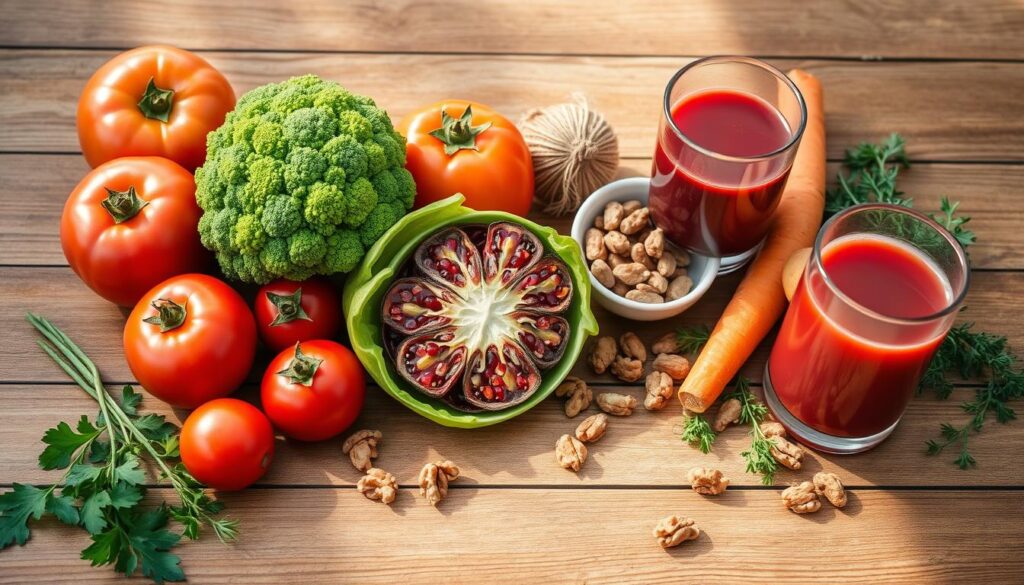
- Edamame for complete protein
- Jicama for high fiber content
- Apples for pectin and quercetin
- Almonds for unsaturated fatty acids and vitamin E
- Plantains for resistant starch and soluble fiber
By eating these foods and following a balanced diet, you can improve your prostate health. This can also lower your risk of prostate cancer.
Recommendations from Leading Urologists
Leading urologists stress the need for a balanced diet for prostate health and nutrition. Eating lots of fruits, vegetables, and whole grains can lower prostate cancer risk. For instance, broccoli can cut the risk of advanced prostate cancer by almost 50%.
They also suggest a high-fiber diet to slow prostate cancer growth in its early stages.
Some key recommendations from urologists include:
- Eating two servings of fatty fish a week for prostate health benefits
- Adding plant-based proteins like beans and lentils to your meals
- Reducing or avoiding foods high in sugar, saturated fat, and sodium
By following these tips and eating well, people can support their prostate health and nutrition. As men get older, focusing on prostate health is key. A healthy diet is a big part of that.

| Food | Recommended Consumption | Prostate Health Benefits |
|---|---|---|
| Fatty Fish | 2 servings per week | Supports prostate health |
| Broccoli | Regular consumption | Reduces risk of prostate cancer |
| High-Fiber Foods | Regular consumption | Slows progression of prostate cancer |
Conclusion: Taking Control of Your Prostate Health Through Diet
Keeping your prostate healthy is key for men’s health. Eating right is a big step in lowering prostate cancer risks. By choosing wisely and avoiding bad foods, men can protect their prostate health and lifestyle.
Up to 60% of prostate cancer risk comes from genes. So, it’s important to tackle diet-related risks. This means making smart food choices.
Limiting processed meats and cutting down on dairy is a good start. Also, watch your salt, sugar, and alcohol intake. Eating more plants and less inflammatory foods can boost your health.
By focusing on a healthy diet, you can improve your life. A balanced diet helps keep your prostate in top shape. It’s a powerful way to take care of your health.
FAQ
What is the prostate gland and what are its functions?
The prostate is a small gland at the bladder base in men. It makes fluid for sperm and helps control urine flow.
How can diet impact prostate health?
Diet is key for a healthy prostate. Some foods help, while others can harm. This affects BPH and prostate cancer risk.
What are the signs of poor prostate health?
Signs include frequent urination and trouble starting or stopping. Feeling like you can’t empty your bladder and pain during urination are also signs.
Why are processed meats harmful to the prostate?
Processed meats like bacon and sausage have preservatives. These can cause inflammation and increase cancer risk. Eating them in moderation is best.
Is there a link between dairy products and prostate health?
The link between dairy and prostate health is debated. Some studies say high dairy intake may raise cancer risk. Others suggest benefits. It’s best to eat dairy in moderation and consider your health.
How do hidden sugars affect the prostate?
Hidden sugars in processed foods can cause inflammation and hormonal imbalances. This harms prostate health. Reading labels and cutting down on added sugars is key.
What are the effects of alcohol on the prostate?
Too much alcohol can lead to prostate enlargement and other issues. It’s best to drink in moderation and follow guidelines for health.
How does caffeine affect the prostate?
Moderate caffeine may help prostate health by reducing cancer risk. But too much can cause enlargement and urinary problems. It’s important to find a balance.
What are the dangers of processed foods for the prostate?
Processed foods have additives and preservatives that harm the prostate. Sticking to whole foods is better for prostate health.
What is the importance of balancing salt and sodium intake for the prostate?
Too much sodium can cause inflammation and prostate issues. Eating foods rich in potassium helps balance sodium and supports prostate health.